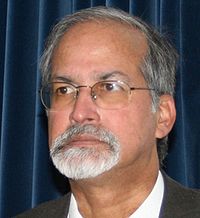- Teotonio R. de Souza
-
Teotonio R. de Souza (born on 18 February 1947) is an Indo-Portuguese historian and the founder-director of the Goa-based Xavier Centre of Historical Research, at Alto Porvorim. Based in Portugal since 1995, Teotonio R. de Souza heads the Department of History in the Universidade Lusófona de Humanidades e Tecnologias. Fellow of the Portuguese Academy of History since 1983, and of the Sociedade de Geografia de Lisboa since 2000.
Contents
Early background
Of Goan Catholic origin, Souza was born in the village of Moirá in the Bardez taulka of Goa. He belongs to the fifth vangodd (clan) of the village and is the 12th generation descendant of Shantappa Kamat, a Goud Saraswat Brahmin who became Diogo de Souza after his conversion to Christianity in 1618.[1]
Souza was educated mostly in Goa during the Portuguese colonial rule. He belonged to the Goa Jesuits during 26 years, and was a professed member of that Religious Order when he opted to leave with dispensation from the Holy See in 1995. Recovered Portuguese nationality in 1995, and was granted OCI (Overseas Citizenship of India) by the Government of India in 2007.
Historical career
Souza has written his PhD thesis, published as Medieval Goa (Delhi, Concept Publ. Co., 1979;First Portuguese edition: Lisboa, Ed. Estampa, 1994; 2nd updated English edition: Panaji, Goa1556 + Broadway Book Centre, 2009) challenges the view that Portuguese rule in South Asia resulted in a period of golden rule in Goa in the sixteenth and seventeenth centuries. Sees "Golden Goa" as an expression popularised by art historians with reference to baroque church architecture of the early centuries of the Portuguese rule. He is the author and editor of many books and research papers. His partial memoirs are penned in a book titled Goa To Me[1] (New Delhi, Concept,1994).
On completion of 60 years, Souza was felicitated with a festschrift edited by C.J. Borges, S.J. and M. N. Pearson, Metahistory: History questioning History[2], Lisboa, Nova Vega, 2007, pp. 606 containing personal tributes and 43 research papers contributed by historians and social scientists from the world over. The Lusophone University [3] of Lisbon awarded him its Gold Medal of Merit on the same occasion in recognition of his research, teaching and promotion of Lusophony.
Teotonio R. de Souza continues to publish in Portuguese and in English on his favourite area of research related to colonial and post-colonial themes, with particular reference to Portuguese in Asia. Since November 2009 has been contributing an OpEd column (p. 8) to the Goan daily HERALD. It is entitled «Historical Explorations» and seeks to link Goa and Portugal, past and present. A sampling of his writings may be consulted online at [Scribd][4] and at the [ReCil Lusófona][5], the online scientific repository of the Universidade Lusófona de Humanidades e Tecnologias, Lisboa.
Current Academic and Research Activities
Teotonio R. de Souza represents the interests of History teaching and research on the Scientific and Pedagogic Councils of the Faculty of Social and Human Sciences of the Universidade Lusófona as elected member. While acting as coordinator / Director of the [MA and M.Phil courses in History][6], also guides Ph.D research in Political Science and International Relations, and directs a line of research related to «Colonial and Post-Colonial Societies and Memories» of CPES (Centro de Pesquisa e Estudos Sociais) of the Faculty of Social and Human Sciences, Universidade Lusófona, Lisboa.
Director-Editor of the Journal of ACSEL (Associação dos Cientistas Sociais do Espaço Lusófono) [CAMPUS SOCIAL][7] and Joint-Director of a new international Review FLUXOS E RISCOS - Revista de Estudos Sociais, that will put out the research findings of CPES (Centre for Social Research and Studies)
References
- ^ Dr. Teotonio R. de Souza: An Autobiography - Goacom.com
External links
Categories:- 1947 births
- People from Goa
- Living people
- Indian Roman Catholics
- Portuguese Roman Catholics
- Indian historians
- Portuguese historians
- Indian writers
- Portuguese writers
Wikimedia Foundation. 2010.

